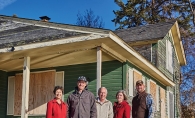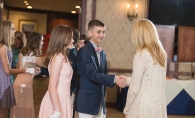In a small computer lab at St. Paul’s Gordon Parks High—where students missing credits can earn them through digital-media storytelling in lieu of traditional classwork—four seniors add the finishing touches to a short film. They’ve chosen to be excused from some of their regular classes to give themselves enough time to finesse the two-minute clip by the submission deadline of a local student film festival. Their project fits a genre usually forced down our throats by government agencies or nonprofit organizations. Tacked up on a wall, their storyboard outlines a public service announcement warning how alcoholism can lead to incarceration among teens.
But this PSA promises a different tone—because for these four students, the PSAs they grew up with roused only negative emotions. Sixth-grade D.A.R.E. classes focused on drugs stopping your heart. Seminars featured prisoners telling their histories of heroin abuse and the grisly side effects. The most common tactics stoked fear—of death, of losing teeth. Today, the four can name the messaging: that anyone falling into substance abuse is helpless, guilty and as good as dead.
Near Gordon Parks, the Rotary Club of St. Paul Sunrise partnered with the school to ask students for their perspectives on addiction. That prompted one of the four to recall a childhood home where drug and alcoholism played out. Another, a member of the Northern Tribe Nation, mulled over harmful Native American stereotypes that have placed ridicule and racism in the way of recovery. The rotary club enlisted the students to turn those perspectives into films.
The three-week alternative-learning class is over, but the four are still at work. Sitting in the computer lab, they determine what a PSA should say, and how it should say it. And on that, they’re unanimous: no fear, no blame.
And the statewide, school-sponsored film showcase, the .EDU Film Festival, accepted the PSA.
Building Off a Homegrown Legacy
The four represent part of what has made Gordon Parks stand out as an alternative high school for more than ten years.
Named after the St. Paul-raised civil rights activist, photojournalist and documentarian, Gordon Parks, the school entrusts students with digital media equipment and asks them to engage their communities. With occasional help from university students and film experts, students can make up missing credits (usually in subjects such as English and social studies) by showing their teachers they can learn curriculum a different way—through visual media. Film captivates students more than, say, writing an essay or preparing for a standardized test. At least, that’s the idea.
“They like the relevancy and the interaction with a real audience,” says Paul Creager, curriculum director and documentarian. Kids today expect that “real audience” more than ever. Popular film-editing apps such as Snapchat and Vine have turned a generation into amateur filmmakers. “They know how many people can see something in a matter of seconds, minutes, hours, days,” Creager says. “Turning in one assignment to one teacher for one grade doesn’t cut through the static anymore.”
Sean Blomgren, one of the students on the PSA team, says he prefers putting his time into something lasting and public. “It’s not a paper that’s gonna get lost in some teacher’s desk,” he says of the PSA. “We’re still gonna see this in 30 years.”
The students’ projects, posted online, work within yearly themes. The 2016–’17 school year, for instance, looked into the importance of green space. But the themes, Creager admits, are loose. The point is that, as in Gordon Parks’ work, civic engagement comes forward—so that the takeaway connects to the local community.
This means that rather than, say, writing a report on the racial dynamics in Huckleberry Finn, one student splices together a short documentary on the impact of I-94’s construction plowing through St. Paul’s predominately African American Rondo neighborhood in the early 1960s.
Other students look into what the school could do with a neighboring five-acre plot of land used for snow storage. They conclude the area needs a park. Next, they come up with park features and present their ideas in some creative visual form. Again in partnership with the rotary club, a festival showcases those ideas on the plot of land at the end of the year.
The students draw from personal experience. One girl, Kamila Omar, wants to establish a communal atmosphere in the park—to make it more than just another place where you enter with those you know and leave with those you know. She conceived of a game strangers could play where they follow instructions that she delivers over a speaker system. The pair learns about each other’s hobbies, families and histories. Enrolling at Gordon Parks during the second half of the school year, Omar devised the idea as an easy way to make friends.
Another student, La’Davia Allcorn, researched the health benefits of green space, inspired to replicate the more natural setting of her hometown of Memphis. “It has meaning,” she says. “When we walk past that park 20 years from now, we’ll be like, ‘Man, we built that park in high school.’ Having our kids playing on it—we did that.”
Voting with Their Feet
The alternative civic engagement and visual storytelling programs are still a work in progress. Ideally, for example, ambitious students wouldn’t have to choose between making their film the best it can be and regularly attending math class.
But for the four students working on the PSA, the priority was clear. They put in hours of editing after school. They compiled a dense folder of research into depression and addiction among teens. They woke at 6 a.m. to film around town. “Half the things I learn in math I forget the next day,” says the group’s actor, Jakob Allrich. “And the things I learn in editing, or in filming, or the angles that I’ve had to use—I’ll probably use sometime this summer.”
Creager describes the students as voting with their feet—showing the school what resonates with them in how they spend their hours.
For one of them, Alyssa Castillo, it affirmed her desire to go into the arts. “This is something that I didn’t realize—and I think some of the other students we worked with didn’t realize—was something we were so passionate about,” she says.
The film festival nominated Castillo in its Minnesota Women in Film and Television: Emerging Filmmaker category.









